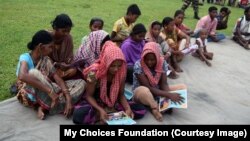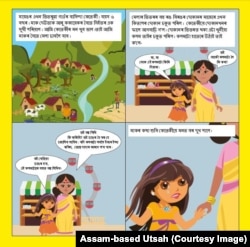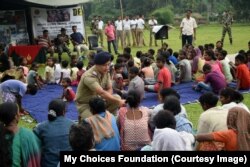Since January of this year, thousands of school children in India’s northeastern state of Assam have pored over an illustrated story of how two young girls from a relief camp were lured by a man who told them of the good life they could lead in a big city, home to swanky buildings and flashy cars. It sounded attractive to the poor youngsters who could only visualize a bleak life ahead.
Fortunately spotted by a policeman as they waited for the man at a railway station to head to the city, the story goes on to relate what their future could have been like when they were sold to work as poorly paid domestic employees, sex workers or laborers.
The comic in the Assamese language aims to raise awareness among children about trafficking rings that lure young girls and boys from villages into India’s booming cities with the promise of good jobs.
The most vulnerable to human traffickers are states such as Assam, where a violent ethnic conflict has displaced many families, and the country’s poorer, underdeveloped states such as West Bengal, Telengana, and Andhra Pradesh.
As child rights campaigners stress prevention as key to addressing the problem, comic books have emerged as an effective tool to empower children to protect themselves in these areas. Children being sold accounted for nearly half of the human trafficking cases in India in 2015.
“There are more colors, more expressions, its an effective means of communication, especially for children,” says Miguel Queah at Assam-based non-profit Utsah, who wrote the story and helps organize reading sessions in vulnerable and displaced communities such as relief camps, children’s homes and government schools in Assam. “Children love reading the stories, discussing among their friends, we could see that response taking place” he says.
Orders to print more comics have gone out with the initial stock of 800 copies having run out and there is a proposal to incorporate it in school curriculums.
The non-profit My Choices Foundation began reaching out to rural communities a little over a year ago with its comic book, The Light of Safe Villages to educate children about threats such as trafficking and other social problems such as child marriage.
Hannah Norling who heads communications at the My Choices Foundation is confident that the colorful books and simple stories in local languages are effectively spreading the message of how traffickers trap young children. “We are in the right place,” she said.
It is distributed to students across more than 500 Indian villages.
She points out that while it is sometimes difficult to reach out to parents, who are busy working, children are more of a captive audience and the idea was to give them an illustrated book that could serve as a complete educational tool which they could share with their parents.
“We had to leave something behind that would be a long term reminder. If something happens a year from now, a physical frame of reference for them to revert back to 'OK now what do I do?” said Norling.
One of the stories in the comic is of a guardian girl on a mission to save others and another of a vigilant boy.
Growing awareness among children has made them more alert to threats from traffickers and some have reported to village council or others if they noticed a friend missing, according to Norling. She said that helped in the rescue of three girls in the past year who had left their village.
The comic book initiative is among several efforts to prevent trafficking in rural areas. One of them by Save the Children spreads the message in local communities through children who have been rescued.
India honored a woman on Wednesday when 21-year-old Anoyara Khatun, who was trafficked from West Bengal state, received the "Women Power" award from the president for stopping hundreds of other children from being forced into labor or married off.
Khatun was brought to Delhi when she was 12 years old and forced to work as a house maid, but managed to escape after six months. With the help of child rights advocates, she returned home and is part of a network of children’s groups in 80 villages where young people are taught about their rights.
Manab Ray at Save the Children in New Delhi points out that once trafficking has happened, there is little that can be done to help the victims, so the key is to stop it in villages. And at the heart of the effort to engage local communities are the children themselves. “Children we found are the best informers, in terms of knowing the issues, because they face it themselves, they can have the natural ability of identifying the traffickers and all,” said Ray.






